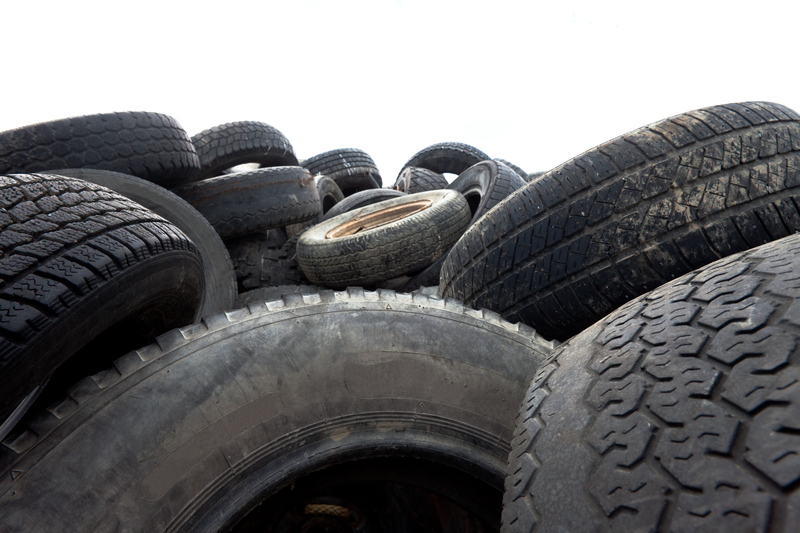Simple Steps to Elevate Recycling Efforts in the Office
The workplace is a hub of productivity, but it can also generate a surprising amount of waste. With sustainability becoming a priority for businesses and employees alike, offices are seeking ways to implement recycling initiatives that are effective, easy, and enduring. If you're looking to improve your office's recycling program or launch a fresh initiative, you've come to the right place. Discover actionable, practical, and simple steps to elevate recycling efforts in the office and be part of the solution for a healthier planet.

Why Office Recycling Matters
Offices generate an estimated 2.7 million tons of waste annually, ranging from paper and plastics to electronics and packaging materials. Elevating recycling in the workplace isn't just about social responsibility - it's about reducing operational costs, boosting company morale, and showcasing environmental leadership.
- Conserves resources: Recycling saves energy, water, and raw materials.
- Reduces landfill impact: Diverting waste means less pollution and environmental harm.
- Meets client and staff expectations: Sustainability is now a selling point for attracting talent and customers.
- Lowers costs: Efficient recycling can reduce landfill fees and waste hauling expenses.
Assessing Your Current Recycling Program
Before you launch new efforts, assess where your office currently stands. Audit your office's waste streams by examining the types and quantities of waste produced. Highlight what is already being recycled, what is contaminating the recycling bin, and what could be improved.
- Review waste collection points and their signage.
- Inspect bins for contaminated materials (wrong items in recycling or trash).
- Note which departments generate the most waste and which generate the least.
- Survey staff to understand existing practices and awareness levels.
Create a Baseline Report
Compile your findings into a straightforward report. Use this document as a benchmark to assess progress as you implement new steps to improve your workplace recycling efforts.
Easy and Effective Steps to Boost Office Recycling
1. Set Clear and Inspiring Goals
Start by defining specific and attainable recycling targets. Examples include reducing landfill waste by 20% in six months, recycling 100% of office paper, or phasing out single-use plastics. Communicate these goals widely through posters, emails, and meetings to build a sense of purpose.
2. Appoint a Green Team or Recycling Coordinator
Designate enthusiastic employees as recycling champions or form a sustainability committee. Their role includes leading initiatives, monitoring progress, educating staff, and acting as the point of contact for recycling questions and suggestions.
3. Upgrade Recycling Bins and Signage
- Place bins in high-traffic areas: Kitchens, break rooms, near printers, and beside vending machines should all have accessible recycling points.
- Use color-coded bins: Clearly distinguish between recycling, compost, and landfill bins with color and shape.
- Attach vivid signage: Include photos and lists of accepted items on every bin to aid correct sorting.
- Offer specialty bins: Provide dedicated bins for batteries, electronics, ink cartridges, and lightbulbs.
Visually appealing and descriptive labels drastically reduce contamination and increase recycling rates.
4. Educate Employees with Ongoing Training
Continuous education is key to sustaining engagement. Organize workshops, send out monthly recycling tips, and invite speakers from local recycling centers. Consider creating a recycling handbook specific to your office to address common questions and confusion.
- Hold lunch-and-learn sessions about recycling best practices.
- Send regular email updates with progress and new tips.
- Celebrate Recycling Awareness Week with games or competitions.
5. Reduce, Reuse, Recycle - In That Order
- Promote digital documents: Encourage cloud storage and e-signatures to cut down on paper.
- Set printers to double-sided as default and reuse scrap paper for notes.
- Switch to reusable items: Provide reusable mugs, dishware, and water bottles to staff.
- Encourage sharing: Platforms for sharing office supplies can reduce over-ordering and waste.
Reducing and reusing is more impactful than recycling alone, so make these practices a foundational part of your sustainable office culture.
6. Compost Organic Waste
Food scraps and coffee grounds contribute heavily to office waste. Implementing an office composting program cuts landfill waste and provides rich soil for plants and gardens. Place compost bins in cafeterias and break rooms, and let staff know what can (and cannot) be composted.
7. Review Purchasing Policies
Examine your supply chain for opportunities to buy recycled and eco-friendly products. Choose recycled-content paper, remanufactured printer cartridges, and non-toxic cleaning supplies. Encourage bulk buying to cut down on packaging, and prefer suppliers with take-back or recycling programs.
8. Partner with Local Recycling Services
Collaborate with reputable local recycling companies to expand your capacity for responsible waste handling. These partners can offer:
- Specialized collection for electronics, batteries, and hazardous materials
- Training and educational support
- Regular waste auditing and progress reports
Overcoming Common Office Recycling Challenges
1. Contamination of Recyclables
Even a small amount of trash in recycling bins can spoil an entire batch. Regularly remind teams what belongs in each bin and conduct spot checks. Try a fun "Recycling Detective" week where teams audit bins and remove contaminants.
2. Staff Apathy
Engagement is essential. Use friendly competitions between departments, recognize top recyclers, or provide eco-friendly incentives such as gift cards, team lunches, or extra break time for participation.
3. Lack of Space
Small offices can still succeed with mini recycling stations or compact, stacked bins. Partner with building management to share resources in common spaces.
The Benefits of Elevating Recycling Efforts in the Workplace
- Environmental Impact: Fewer resources are consumed, and less waste ends up in landfills.
- Social Responsibility: Your company builds a reputation for caring about the environment, which strengthens your brand.
- Economic Efficiency: Lower waste disposal costs and potential for selling recyclables.
- Employee Engagement: Staff feel proud to work for a company that's making a difference.
Commitment to workplace recycling sends a powerful message inside and outside your business.
Measurement and Continuous Improvement
Track your recycling rates monthly and compare to your initial audit's baseline. Share results transparently with staff and adjust strategies as needed. Successful office recycling efforts are dynamic and should evolve in response to feedback and changing business needs.
- Install weighing scales on bins to measure waste diverted from landfill.
- Use visual dashboards or infographics to share progress in real time.
- Solicit staff feedback and reward process improvements.
Creative Ways to Celebrate Recycling Success
Recognizing achievements motivates your team to keep up positive behaviors. Consider these ideas:
- Host a green awards ceremony for the departments or individuals who have contributed most to the program.
- Launch a "zero-waste day" challenge where the entire office aims for minimal or no waste output.
- Create a "recycler of the month" spotlight in your office newsletter.
- Organize staff volunteer days with local environmental groups.
Key Takeaways: Start Simple, Achieve Big Impact
- Begin with a clear, realistic assessment of your current office recycling efforts.
- Engage and empower staff at every stage.
- Use clear bins and signage, and provide regular education on sustainable practices.
- Prioritize reduction and reuse alongside recycling for the greatest environmental benefit.
- Measure and celebrate improvements to maintain momentum.
Every office can make meaningful strides in sustainability by starting with simple steps to elevate recycling efforts at work. Together, these small changes add up to a major difference for the environment, the community, and your business's bottom line.

FAQs on Workplace Recycling Best Practices
-
What office items are most important to recycle?
Paper, cardboard, plastic bottles, cans, ink cartridges, batteries, and electronics should always be recycled where facilities exist. -
How can my office encourage recycling participation?
Make recycling as easy as possible, offer regular education and friendly competitions, and recognize enthusiastic participants. -
Should we compost in the office?
Yes! If your office produces kitchen or coffee waste, composting is a powerful way to cut landfill output and support local agriculture or landscaping efforts. -
What do I do with hard-to-recycle items?
Partner with specialty recyclers or collection programs for items like e-waste, batteries, and fluorescent lights.
Conclusion: Make Office Recycling a Lasting Success
Elevating recycling programs in your office isn't just a box-ticking exercise - it's an opportunity to create lasting, positive change. With clear goals, committed leadership, visible improvements, and ongoing education, your workplace can lead the way to a cleaner, greener future. Start now with these simple steps to elevate recycling efforts in the office, inspire those around you, and watch as sustainability becomes a proud part of your workplace identity.